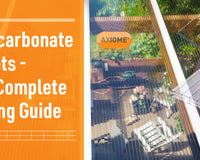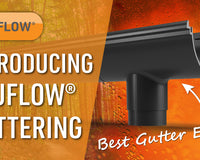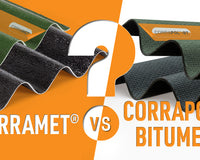Glazing Bars are manufactured from two materials: PVC and Aluminium. So, which one should you choose?
Unsurprisingly, most people think that PVC means cheaper but weaker and aluminium means stronger but more expensive. However, surprisingly it is not as clear cut as that!
Why is it important to understand the difference between aluminium and PVC Glazing Bars? Selecting the right glazing bar for a project is the most essential factor in determining the strength and lifespan of a roof. Choosing the wrong glazing bar can lead to lifespan and leaking issues in the future so it is worth making your decision carefully.
In case you are unsure, PVC glazing bars are sometimes also called plastic glazing bars as PVC is a type of plastic. PVC stands for Polyvinyl chloride, and it is the world’s third-most widely produced synthetic polymer of plastic Other common products that are made from PVC include windows, upvc fascia, flooring and cladding. It is very widely used.
There are seven factors to consider when choosing the type of glazing bars for your roof. In this guide, we will evaluate the differences between aluminium and PVC glazing bars to discover what option is best for you.
Below are the 7 main points we will compare:
If you are reading this article, we’ll assume you know what glazing bars are, but if not here’s a quick overview before the comparison starts. Glazing bars, also known as joining bars, are used in roofing projects where you are installing clear glazing. They are installed on pitched or flat roof structures to secure your roofing sheets down to your frame and to create a waterproof seal between your glazing, whether you are using glass or polycarbonate sheets.
Strength
Metal is naturally stronger than plastic so all aluminium glazing bars are inherently stronger bars compared to PVC glazing bars. Aluminium Glazing bars don’t crack or split so provide a very strong installation.
Another point of strength with the Aluminium bars comes from the way they are installed. They are screwed down using variable pressure fixing screws, offering a stronger fixing than the snap-down installation of PVC bars. This means they are excellent glazing bars for glass.

Because of its strength, aluminium is the only option for self-supporting bars and is preferred by trade when completing jobs. This glazing bar has been manufactured with strong seals and a full top cap which is designed to increase the lifespan of your roof.
On the other hand, High-quality PVC glazing bars, like the Snapa® range, have a good amount of strength but are better suited for small-medium DIY-type projects. These PVC bars are extruded with a significant wall thickness to provide a good degree of strength and rigidity. However, they are not as robust as the aluminium options.
Strongest Glazing Bar Type: Alukap® Aluminium Glazing Bars
Life Span
It’s common knowledge that aluminium is more robust than PVC. The estimated life span of aluminium glazing bars is more than 20 years. They are a long-lasting option and will save you money over time, not having to replace any deteriorating gazing bars after a few years.
PVC Glazing bars have approximately 10 years life span, however, they may last longer than that if maintained well.
The durability of the material is an important point to consider, as you want your glazing bars to last as long as your roofing sheets. Polycarbonate sheeting, for example, lasts 10-20 years.
Longest Lasting Glazing Bar Type: Alukap® Aluminium Glazing Bars
Cost
Comparing the two bar types, PVC glazing bars are the cheapest option upfront. PVC glazing bars are a great low-cost option for smaller roofs where you may have a limited budget. This is why they are commonly used for lean-tos, decking covers, and small pergolas.
PVC glazing bars are designed with cost-efficiency in mind so DIYers and trades use them to complete their roofing project whilst maintaining a professional finish! As they are manufactured using plastic, naturally it is a lot cheaper to manufacture and can keep your cost down. It is worth noting that PVC glazing bars can only be installed with multiwall and twinwall polycarbonate sheets, but more on this later.
In comparison, because of their high quality and pleasing finish aluminium glazing bars come in at a higher upfront cost. However, before you discount them, this is not a bad thing as they last over double the time so aluminium glazing bars are often more cost-effective in the long run. We recommend weighing up all the benefits of aluminium glazing bars against the cheaper PVC option.
When considering a project budget, we often only review the initial investment. It is worth thinking about the lifetime cost of a roof as well. If you install cheaper but shorter-lasting products in the first place, the spending on repairs and replacements will soon mount up.
Glazing Type
Most good quality polycarbonate glazing bar systems are designed and manufactured with multiple click connection points. For example, the Snapa Snap Fix glazing bar will work well with 10mm, 16mm and 25mm polycarbonate sheets.
Nevertheless, as PVC Glazing bars involve snapping down onto polycarbonate, it is not suitable for use with glass sheets. It will not support the glass sheet firmly; it will most likely lead to the glass sliding out the snap-down bar which will cause your build major problems.
Aluminium glazing bars can be installed in projects using glazing of any thickness! These bars are therefore compatible with 6mm solid Glazing sheets to 35mm Multiwall polycarbonate to 24mm double glazed glass units. Our Solid Polycarbonate Sheets are very popular for installation with these bars on pergolas.
This is why installers find aluminium glazing a huge benefit due to the immense range of glazing possibilities. In addition, The cover cap guarantees that all fixings are concealed from view ensuring it has a neat finish.
Glazing Bar with most Glazing Options: Alukap® Aluminium Glazing Bars
Colour
When it comes to choosing a colour for your bars, PVC does have the advantage of easy decision-making as they only come in one colour: white. This is because brown or darker-coloured PVC glazing bars can discolour fast. White is also one of the most popular colours for aluminium glazing bars as it creates a clean look. As a neutral colour, it works nicely with many colour schemes.
However, the colour limitation of PVC Glazing Bars can also be seen as a disadvantage for many in the trade, as they don’t always match the sheet colour. For example, if you have bronze sheets, white glazing bars are not going to compliment your design, it will look better with brown glazing bars.

Aluminium glazing bars provide a solution for this, coming in white or brown as standard. What’s more, you also have the option of bespoke powder-coating your glazing bar to any RAL colour.
People working with timber, especially hardwoods, tend to choose our brown glazing bars as they complement the wood characteristics nicely! Alternatively, if you want to match your existing house or window colours or add a splash of colour to your garden, then a bespoke powder-coated option is the one for you. Popular bespoke colours include anthracite grey, pillar box red and cobalt blue.
Glazing Bar with most Colour Options: Alukap® Aluminium Glazing Bars
Rafter or Self Supported
Rafter-supported glazing bars are manufactured in both PVC and aluminium.
If you have invested in hardwood rafters and beams, it is worth choosing aluminium glazing bars for their strength and durability. A 55mm rafter rubber gasket covers the rafter fully. It cushions the glazing bar and provides an additional waterproofing seal. This gasket is ideal for rafters or beams from 60mm upwards alonside our Best selling 60mm glazing bars.
Aluminium bars come with 2 rafter gasket choices, either standard or slot fit, both options come pre-lubricated with a special lubricant meaning it’s safe to use with glass. The gasket lubrication reduced any friction build-up due to the natural expansion and contraction. Alternatively, the gasket is already attached to Snapa Fix PVC rafter glazing bars, saving the hassle of clipping them in.
Standard rafter gasket is the easiest and most popular choice for aluminium rafter glazing bars. However, a gasket with a slot fit has been manufactured to save installers time on the job. A groove has been constructed in the middle of the gasket which means the rafter gasket can be instantly installed in a perfect position before the glazing sheet is placed onto the roof.
If you require a self-supporting glazing bar, aluminium systems will be the only option available to use. These would need to be installed using eaves beams, L caps and, posts which will allow the glazing bar to provide a self-supporting structure. The PVC material won't be strong enough to hold up the whole weight of the roof, so the only option to use PVC is using a timber structure.
Roof Type
PVC glazing bars are most suitable for smaller projects and structures. Traditionally, they would have been only used on lean-to structures, such as carports, however, now using a Super Ridge they are also suitable for apex structures.
Aluminium Glazing Bars are the best choice for large projects. Commercial jobs or home improvement projects where quality and life span are essential factors feature this glazing bar. For example, they are a superb conservatory glazing bar.
Aluminium bars are also great for curved roofs like barrel roof lights and bike shelters. They can be used with tight radiuses; it is worth noting that an additional Tex screw through the top clip may be required on the terminal ends of the bar when installing to a radius.
In fact, Aluminium glazing bars are one of the most adaptable glazing joiners available. They can get installed on top of a range of rafter types, including timber rafters, steel beams, or aluminium frames.
Most versatile Glazing Bar: Alukap-XR Glazing Bars
What is the best Glazing bar to use?
When deciding between PVC or Aluminium glazing bars, our teams recommend choosing aluminium glazing bars compared to PVC for their extra lifespan, strength and colour options. Only Aluminium glazing bars can be installed with glass, so they offer greater flexibility in glazing choice.
Best Type of Glazing Bar: Aluminium Glazing Bars
Cheapest (initially) Type of Glazing Bar: PVC Glazing Bars
As discussed, although there is a cost difference, with PVC being the budget option, this will eventually even out as aluminium has a longer life span resulting in a cheaper lifetime cost.
Although both bars do have great advantages, it is clear it depends on the glazing sheet you are using and your frame structure. If you have not already got a frame structure in place the self-supporting glazing bars would be the most recommended choice for your project.
Need Help Choosing the Right Glazing Bars?
If you are needing help building quote for our Glazing Bars please get in touch. Our Team will be happy to assist on our Live Chat or you can email shop@clearamber.com where our we will provide you with all the advice and support you require for your project.
Place Your Order Today – Get Same Day Despatch, Free Returns & Flexible Payment!















1 comment
viva fenester
A detailed breakdown of PVC versus aluminum glazing bars for glass windows. Highly informative for selecting affordable and long-lasting window options.